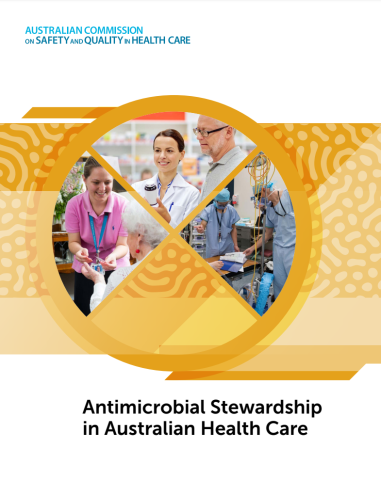NSQHS 3 HAI
Antimicrobial stewardship
Antimicrobial stewardship includes the range of activities that promote and support optimal antimicrobial prescribing and use. The aim of the Commission’s work on antimicrobial stewardship is to improve the safe and appropriate use of antimicrobials, reduce patient harm and prevent and contain antimicrobial resistance in Australia.
Overview
Inappropriate use, and overuse, of antimicrobials contributes to an increase in resistant bacteria and may result in patient harm. Patients with antimicrobial-resistant infections are more likely to experience ineffective treatment, recurrent infection, delayed recovery, or even death.
Antimicrobial stewardship (AMS) programs have been shown to decrease inappropriate antimicrobial usage, improve patient outcomes and reduce adverse consequences of antimicrobial use (including antimicrobial resistance, toxicity and unnecessary costs). Together with infection prevention and control, hand hygiene and surveillance, antimicrobial stewardship is considered a key strategy in local and national programs to prevent the emergence of antimicrobial resistance and decrease preventable healthcare associated infection.
The Preventing and Controlling Infections Standard requires all health service organisations to have an AMS program that:
- Includes an antimicrobial stewardship policy
- Provides access to, and promotes the use of, current evidence-based Australian therapeutic guidelines and resources on antimicrobial prescribing
- Has an antimicrobial formulary that is informed by current evidence-based Australian therapeutic guidelines and resources, and includes restriction rules and approval processes
- Incorporates core elements, recommendations and principles from the current Antimicrobial Stewardship Clinical Care Standard
- Acts on the results of antimicrobial use and appropriateness audits to promote continuous quality improvement
- Reviews antimicrobial prescribing and use
- Uses surveillance data on antimicrobial resistance and use to support appropriate prescribing
- Evaluates performance of the program, identify areas for improvement, and take action to improve the appropriateness of antimicrobial prescribing and use
- Reports to clinicians and the governing body regarding
- compliance with the antimicrobial stewardship policy and guidance
- areas of action for antimicrobial resistance
- areas of action to improve appropriateness of prescribing and compliance with current evidence-based Australian therapeutic guidelines or resources on antimicrobial prescribing
- the health service organisation’s performance over time for use and appropriateness of use of antimicrobials
The Commission has developed a number of resources to support health service organisations to meet the antimicrobial stewardship requirements of the National Safety and Quality Health Service Standards and the National Safety and Quality Primary and Community Healthcare Standards. These resources are designed to assist health organisations, their workforce and their consumers in implementing effective antimicrobial stewardship practices.
AMS in Australian Health Care
The Commission’s Antimicrobial Stewardship in Australian Health Care (AMS Book) was first published in 2018. Additional chapters to support AMS in specific settings have been progressively published since 2018. The sequence for publication of chapters is as follows:
- 2018: Chapters 1–12
- 2020: Chapters 13–14
- 2021: Chapters 15–17
- 2022: Chapters 18–19
- 2023: Chapter 20
Surveillance of antimicrobial use
The Antimicrobial Use and Resistance in Australia (AURA) Surveillance System collects and analyses data on antimicrobial use and resistance in Australia. See Community Antimicrobial Use and Hospital and Aged Care Antimicrobial Use for more information.
The most recent data on antimicrobial use in Australia are available in AURA 2023: Fifth Australian report on antimicrobial use and resistance in human health.
A range of companion resources is also available for AURA 2023, including Highlights for Pharmacists.


